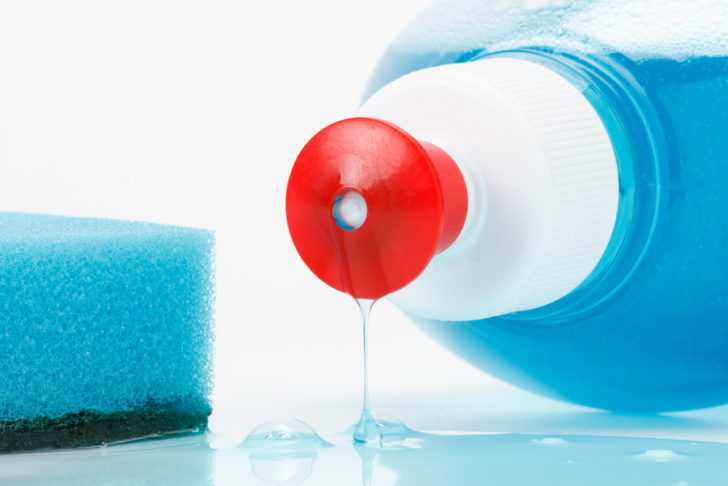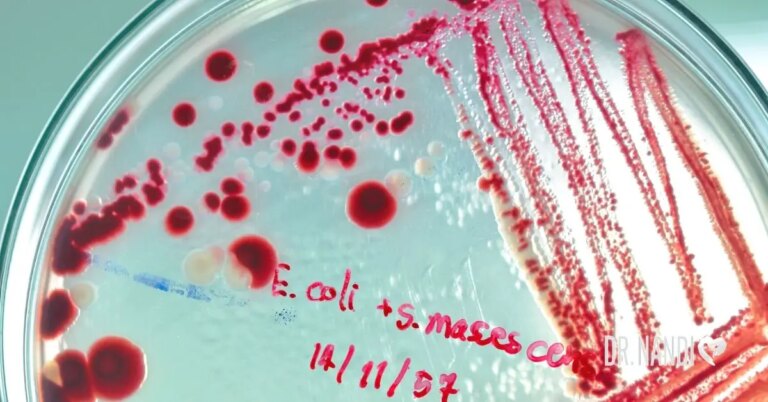Dawn dish soap, a staple in many households, is widely trusted for its effective cleaning properties. However, this popular product harbors potential risks that many users are unaware of. In this article, we will explore the concerning ingredients found in Dawn dish soap and discuss the implications for both human health and the environment. This deep dive, based on information from the Environmental Working Group (EWG), aims to shed light on the toxic elements present in this everyday cleaner.
Dawn dish soap is renowned for its ability to cut through grease and tackle tough stains, making it a versatile cleaning agent in many homes. Its various formulations and pleasant scents have made it a favorite for a range of tasks, from washing dishes to removing pet stains. However, beneath its attractive branding lies a cocktail of chemicals that may pose serious health risks and environmental concerns. It’s time to take a closer look at what exactly is in this widely used product and why it might be worth considering alternatives.
Toxic Ingredients in Dawn Dish Soap and Their Health Implications
Dawn dish soap contains several ingredients that have raised red flags for their potential health risks. According to the Environmental Working Group (EWG), many of these ingredients can cause skin irritation, allergies, and more severe health issues. Here’s a closer look at some of the most concerning chemicals found in Dawn dish soap:
- Methylisothiazolinone: This preservative is known for its acute aquatic toxicity and has been linked to skin irritation and allergic reactions. Individuals with sensitive skin may find this ingredient particularly harmful, as it can exacerbate conditions such as eczema and dermatitis.
- C9-11 Pareth-8: Another ingredient flagged by the EWG, C9-11 Pareth-8, can cause allergic skin reactions and is also harmful to aquatic life. It’s a surfactant, which helps the soap cut through grease but can leave behind residues that irritate the skin.
- Sodium Lauryl Sulfate (SLS): Commonly used in cleaning products, SLS is a surfactant that can lead to chronic aquatic toxicity. It’s also known to irritate the eyes and skin and may cause more severe issues like organ damage with prolonged exposure.
- Fragrance: The term “fragrance” in ingredient lists can be a cover for numerous undisclosed chemicals. These can include allergens, irritants, and even hormone disruptors. The lack of transparency makes it challenging for consumers to know exactly what they are being exposed to.
Beyond these, Dawn dish soap may contain other harmful substances like phosphates, triclosan, sodium laureth sulfate (SLES), diethanolamine (DEA), monoethanolamine (MEA), triethanolamine (TEA), chlorine, formaldehyde, and ammonia. These ingredients not only pose potential health risks but also contribute to environmental pollution. Understanding these risks is crucial for making informed choices about the cleaning products we use daily.

Is Dawn Dish Soap Safe for the Environment and Your Health?
While Dawn dish soap is marketed as a safe and effective cleaning product, questions about its safety for both humans and the environment have surfaced. The term “safe” can be misleading, as it often overlooks the potential long-term effects of repeated exposure to certain chemicals found in the soap.
Environmental Concerns
Dawn dish soap contains several ingredients that are not biodegradable, meaning they do not break down naturally in the environment. Despite claims of using “biodegradable surfactants,” the majority of the product’s components persist in ecosystems, potentially harming aquatic life. Chemicals like methylisothiazolinone and sodium lauryl sulfate (SLS) are particularly concerning as they can cause acute toxicity in aquatic environments, affecting fish and other wildlife. Moreover, the plastic bottles used for packaging contribute to environmental waste, as they are not biodegradable and require proper recycling, which is not always guaranteed.
Health Implications
From a health perspective, the safety of Dawn dish soap is equally debatable. Ingredients such as SLS, methylisothiazolinone, and unspecified fragrance compounds can lead to skin irritation, allergies, and even more serious conditions with prolonged exposure. The presence of these chemicals is especially concerning for individuals with sensitive skin or allergies, as they can exacerbate skin conditions and respiratory issues. Furthermore, the antibacterial variants of Dawn dish soap contain triclosan, an ingredient that has been scrutinized for its potential role in promoting antibiotic resistance and disrupting hormonal balance.
While Dawn dish soap is widely used and trusted, its safety for health and the environment is not as clear-cut as it may seem. Understanding the potential risks associated with its ingredients is crucial for consumers who aim to make healthier and more eco-friendly choices.

Dawn Dish Soap and Wildlife: A Controversial Relationship
Despite its reputation as a household staple, Dawn dish soap’s relationship with wildlife conservation is complex. The brand has famously marketed itself as a protector of animals, particularly in campaigns highlighting its use in cleaning oil-covered wildlife. While these efforts are commendable, they present a paradox given the product’s chemical composition.
Environmental Impact of Chemicals
Key ingredients in Dawn dish soap, such as methylisothiazolinone and sodium lauryl sulfate (SLS), are known to be harmful to aquatic organisms. These chemicals can disrupt aquatic ecosystems by causing harm to fish and other marine life, leading to imbalances that can ripple through the food chain. The surfactants and other chemicals can reduce water quality, making it difficult for aquatic life to survive and thrive.
Charitable Efforts vs. Environmental Realities
While Procter & Gamble, the parent company of Dawn, has donated millions of dollars to wildlife conservation efforts, there is an inherent contradiction in using a product that contributes to environmental degradation. The campaigns showcasing Dawn’s role in saving wildlife do not fully account for the broader environmental impact of the soap’s ingredients. This dual narrative raises questions about the overall efficacy and ethics of such corporate social responsibility efforts.
A Call for Transparency and Safer Products
As consumers become more environmentally conscious, there is an increasing demand for transparency and safer product formulations. While the charitable actions of the company are positive, they do not negate the potential harm caused by the chemicals in their products. For truly impactful conservation efforts, it is crucial that companies like Dawn address the environmental impact of their products and work towards more sustainable alternatives.
Dawn Dish Soap and Septic Systems: What You Need to Know
While Dawn dish soap is a common choice for many households, those with septic systems need to be cautious. The ingredients in Dawn, especially those with antibacterial properties, can disrupt the delicate balance of bacteria in septic systems, which are essential for breaking down waste.
Impact of Antibacterial Agents
Dawn’s antibacterial variants contain agents like triclosan, which are effective in eliminating bacteria on surfaces. However, in a septic system, these agents can kill beneficial bacteria that are vital for the system’s proper functioning. The bacteria in septic tanks help decompose solid waste, and a reduction in their population can lead to inefficiencies in waste breakdown. This can result in clogs, backups, and the need for more frequent tank pump-outs.
Septic System Safety
For households with septic systems, it is crucial to use cleaning products that are labeled as septic-safe. While some Dawn products may be safe for septic use, particularly those without antibacterial properties, it is important to check product labels and opt for formulations that do not contain harmful chemicals. Even non-antibacterial versions can contain surfactants and other chemicals that might not be ideal for septic systems if used excessively.
Eco-Friendly Alternatives
To maintain the health of septic systems, consider using eco-friendly and biodegradable cleaning products. Natural options like castile soap or plant-based cleaners can be effective alternatives. These products are typically free from harsh chemicals and are safer for both the environment and septic systems. Additionally, using natural drain cleaners can help maintain the enzyme and bacterial balance crucial for the septic system’s efficiency.
In conclusion, while Dawn dish soap is a versatile cleaning agent, it is important to consider its impact on septic systems. Opting for septic-safe or natural alternatives can help preserve the functionality of your system and prevent costly repairs.

Non-Toxic Alternatives to Dawn Dish Soap
As awareness grows about the potential risks associated with conventional dish soaps like Dawn, many consumers are seeking safer, more eco-friendly alternatives. Fortunately, there are numerous non-toxic options available that provide effective cleaning power without the harmful side effects.
- Dropps Power Dish Spray: Dropps Power Dish Spray is an innovative, sustainable dish soap that utilizes vegan, biodegradable, and plant-based ingredients. This soap is free from harsh chemicals like phosphates, SLS, and artificial fragrances, making it a safer choice for both human health and the environment. Additionally, its packaging is designed to minimize waste, further reducing its environmental footprint.
- Biodegradable Castile Soap: Castile soap is a versatile, biodegradable option made from vegetable oils. It’s gentle enough for sensitive skin and can be used for a variety of cleaning purposes, including dishwashing. Castile soap is free from synthetic detergents and preservatives, making it an excellent choice for those looking to avoid harmful chemicals. It is also septic-safe and can be used in eco-friendly cleaning routines.
- Seventh Generation Dish Liquid: Seventh Generation offers a plant-based dish soap that is both effective and gentle. This product is free from synthetic fragrances, dyes, and phosphates, making it a healthier option for daily use. Seventh Generation is committed to sustainability, and their products are often packaged in recycled materials, further supporting eco-friendly practices.
- Ecover Zero Dish Soap: Ecover Zero is an excellent choice for those with sensitive skin or allergies. It is free from fragrances, dyes, and phosphates, and is made from renewable, plant-based ingredients. Ecover Zero is also biodegradable, ensuring that it has minimal impact on the environment.
- Method Dish Soap: Method offers a range of dish soaps made from naturally derived ingredients. Their formulas are designed to be tough on grease but gentle on the skin and the environment. Method products are biodegradable and come in stylish, recyclable packaging, making them a popular choice for eco-conscious consumers.
Choosing non-toxic alternatives to Dawn dish soap not only benefits personal health but also contributes to environmental conservation. These eco-friendly options provide effective cleaning without compromising safety, making them ideal for households seeking a greener lifestyle. By making the switch, consumers can protect their skin, support wildlife, and promote a cleaner planet.
My Personal RX on Protecting Your Health with Safer Cleaning Products
As a doctor, I always emphasize the importance of being mindful of what we expose our bodies to, including household cleaning products. The chemicals in everyday items can have long-term effects on our health, particularly on our immune system, skin, and overall well-being. Choosing safer alternatives is not just about avoiding immediate irritation but also about long-term health benefits. Here are some tips to help you make healthier choices in your cleaning routines:
Choose Natural and Plant-Based Dish Soaps: Opt for options like Dropps Power Dish Spray that are gentle on the skin and free from harsh chemicals. This helps reduce exposure to irritants and promotes healthier skin.
Support Your Immune System: Maintaining a strong immune system is crucial, especially when exposed to household chemicals. Consider taking Immune Support supplements to enhance your immune resilience and overall health.
Educate Yourself About Toxic Ingredients: Use a Toxic Ingredient Guide to learn about harmful chemicals commonly found in cleaning products. Being informed helps you make smarter and safer choices for your household.
Use Biodegradable and Septic-Safe Products: Selecting products like Biodegradable Castile Soap not only protects your health but also reduces environmental impact, ensuring a safer home water system.
Protect Your Body with Omega-3s: When your body encounters chemical irritants from cleaning products, inflammation can occur at the cellular level. Omega-3 Fish Oil supports cardiovascular health, maintains a normal inflammatory response, and supports healthy skin, joints, and connective tissue.
Select Sustainable Brands: Brands like Seventh Generation and Method offer effective cleaning solutions that are also eco-friendly. Supporting these brands helps you contribute to a healthier planet.
Avoid Antibacterial Agents When Possible: Limit the use of antibacterial agents, which can disrupt beneficial bacteria in your environment and body. This is especially important for maintaining a balanced microbiome.
Prioritize Transparent Ingredient Lists: Choose products with clear ingredient labeling to avoid hidden harmful chemicals. Knowing what’s in your products empowers you to make safer choices.
Why Choosing Safer Cleaning Products Matters
Many dish soaps and household cleaners contain chemicals that seem harmless but can irritate skin, disrupt hormones, and leave residues on the very items used to serve food. Over time, these hidden toxins build up in homes, quietly affecting health without families realizing it. Choosing safer cleaning products means protecting not only your dishes but also your skin, your family, and your long-term well-being.
Truly Free offers an effective, non-toxic alternative designed to clean powerfully without compromise. With eco-friendly refills and family-safe ingredients, Truly Free makes it easy to ditch harsh chemicals while supporting a healthier home and planet.
Sources:
- Environmental Working Group – EWG’s Dirty DozenTM and Clean FifteenTM Lists are here! | Environmental Working Group. (2021, November 3). EWG. https://www.ewg.org/
- Sodium lauryl sulfate (SLS) – Chemical safety facts. (2022, October 14). Chemical Safety Facts. https://www.chemicalsafetyfacts.org/chemicals/sodium-lauryl-sulfate-sls/#:~:text=Cleaning%20Products-,SLS%20is%20an%20effective%20surfactant%20used%20in%20household%20cleaning%20products,degreasers%20and%20industrial%20strength%20detergents.
- Triclosan | US EPA. (2024, March 28). US EPA. https://www.epa.gov/ingredients-used-pesticide-products/triclosan#:~:text=Triclosan%20(2%2C4%2C4,bacteria%2C%20fungi%2C%20and%20mildew.











 Subscribe to Ask Dr. Nandi YouTube Channel
Subscribe to Ask Dr. Nandi YouTube Channel









